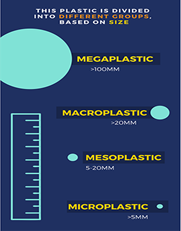

There are 12-21 million tonnes of tiny plastic fragments floating in the Atlantic Ocean, scientists have found.
Context
There are 12-21 million tonnes of tiny plastic fragments floating in the Atlantic Ocean, scientists have found.
About
- What is marine microplastic?

- Marine microplastics (10–1000 µm) belong to the continuum of the discarded plastic debris that enters the ocean from land-based and marine sources.
- The pathways of plastic input are very diverse and include riverine and atmospheric transport from
- coastal and inland areas
- illegal dumping activities
- erosion of legacy refuse dumps
- direct at-sea littering from shipping, fishing and aquaculture activities
- The ubiquitous presence of microplastics in the marine environment raises concerns over damage they could cause to oceanic ecosystems and eventually to human health.
Key-highlights of the Study
- The new study finds that the total amount of plastic making its way into the Earth's oceans is likely higher than previous estimates suggest.
- A previous study published in 2015 estimatedthat upward of 12 million metric tons of plastic trash made it into the oceans in 2010 alone.
- The new study estimates that there is upward of 21 million metric tons of three common types of small plastic pollution in just the top 200 meters of the Atlantic-
- Polyethylene
- Polypropylene
- Polystyrene
How does it impact the environment?
- Difficult to decompose: Plastic can take hundreds to thousands of years to decompose depending on the type of plastic and where it has been dumped.
- Harmful for the ecosystem: In the oceans, plastic pollution impacts marine life, ocean health, coastal tourism and even human health.
- Marine animals unknowingly ingest plastic and often suffocate.
- While all sorts of marine species are prone to get impacted by plastic pollution, typically, bigger marine species tend to get more attention because of the amounts of debris they can hold up.
- Impacting the entire food chain: Microplastics below the surface of the ocean are bad news for the whole food chain. Small ocean-dwelling creatures eat them, and the plastic makes its way into larger fish and shellfish that humans eat.


